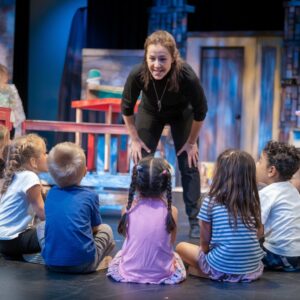Introducing young children to live theatre in schools is a profoundly impactful initiative that transcends entertainment. It can ignite imaginations, foster emotional intelligence, and develop essential life skills while enhancing engagement across academic disciplines.
theatre in schools is a profoundly impactful initiative that transcends entertainment. It can ignite imaginations, foster emotional intelligence, and develop essential life skills while enhancing engagement across academic disciplines.
By integrating theatre into the educational experience, schools can create a fertile environment for personal and intellectual growth, preparing students for success in an increasingly complex world.
Building Empathy and Emotional Intelligence
Live theatre presents stories that explore diverse human experiences, emotions, and cultures. Children who witness these narratives can step into the characters’ shoes, understand their struggles, and share their triumphs. This process builds empathy, a crucial skill for fostering strong interpersonal relationships.
Moreover, the shared experience of live theatre—watching actors bring stories to life in real time—creates a sense of connection and community. This communal engagement allows children to better understand social dynamics, recognize different perspectives, and develop emotional intelligence. These skills are invaluable in social settings, as well as in understanding literature, history, and even conflict resolution.
Enhancing Communication Skills
Theatre inherently revolves around communication. Children learn how ideas and emotions are conveyed effectively through dialogue between characters, gestures and expressions of the actors, or interactions between performers and the audience. For students who participate in theatrical productions, these experiences offer hands-on opportunities to develop their communication skills. They learn the importance of voice modulation, body language, and active listening—transferable skills to classroom discussions, presentations, and personal relationships.
Stimulating Creativity and Critical Thinking
Theatre is a creative medium that challenges traditional thinking. For children, this exposure can be transformative. Watching a play or musical encourages them to think creatively, question conventional narratives, and consider new ideas. This ability to approach problems creatively can benefit them in subjects such as science, technology, engineering, and mathematics (STEM), where innovative thinking is often the key to success.
Furthermore, analyzing a play’s themes, characters, and settings sharpens critical thinking skills. It encourages children to delve deeper into complex concepts, make connections, and articulate their thoughts clearly. These cognitive skills enhance their ability to engage with challenging material across various academic subjects.
Improving Academic Performance
 Studies have shown that exposure to the arts, including live theatre, can boost academic performance. The National Endowment for the Arts highlights that students involved in the arts are more likely to achieve higher grades, score better on standardized tests, and have lower dropout rates. Theatre’s interdisciplinary nature—combining elements of literature, history, music, and visual art—can also help children see connections between subjects, making learning more cohesive and enjoyable.
Studies have shown that exposure to the arts, including live theatre, can boost academic performance. The National Endowment for the Arts highlights that students involved in the arts are more likely to achieve higher grades, score better on standardized tests, and have lower dropout rates. Theatre’s interdisciplinary nature—combining elements of literature, history, music, and visual art—can also help children see connections between subjects, making learning more cohesive and enjoyable.
For instance, watching a historical drama can bring historical events to life, making them more relatable and memorable than traditional textbook learning. Similarly, plays with mathematical or scientific themes can spark interest in these subjects, helping students grasp concepts dynamically and engagingly.
Building Confidence and Resilience
Participation in theatre, whether as an actor, stagehand, or audience member, builds confidence. Children learn to take risks, overcome stage fright, and adapt to unforeseen challenges—skills vital for personal and professional success. Theatre teaches resilience as children see how characters navigate setbacks and emerge stronger. These lessons inspire students to approach their challenges with determination and optimism.
Cultivating a Lifelong Appreciation for the Arts
Early exposure to live theatre fosters an appreciation for the arts that can last a lifetime. Children who experience the magic of live performances are more likely to value artistic expression and cultural heritage. This appreciation enriches their lives and contributes to the community by supporting the arts.
Implementing Theatre in Schools
Integrating theatre into schools does not require a complete overhaul of the curriculum. Schools can start by organizing field trips to local theatre productions, inviting professional actors to perform on campus, or incorporating simple drama activities into the classroom. Over time, they can establish school theatre programs, offering students opportunities to participate in productions or join drama clubs.
Partnerships with local theatre companies can also provide invaluable resources, from workshops and mentorship programs to discounted tickets for students. These initiatives not only make theatre more accessible but also demonstrate the community’s commitment to holistic education.
theatre enhances life skills
Introducing young children to live theatre in schools is more than an enrichment activity; it is an investment in their future. Theatre fosters empathy, enhances communication, stimulates creativity, and strengthens critical thinking, all while improving academic performance and building life skills. By making live theatre a cornerstone of education, schools can unlock the potential within every child, preparing them to navigate life’s complexities with confidence and compassion.
